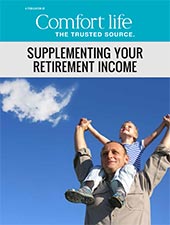Lists of reports on this page:
Find care details, insights, and insider perspectives gained from 20+ years of helping seniors and families.
What to know about this topic:
- Consider whether you are a workaholic
- How can a workaholic retire?
- Three tips for workaholics or others worried about retiring
How many times have you retired? Zero is the answer most people considering retirement give. If you are in your mid-50s or older I assume that the idea of retiring has crossed your mind, maybe even flooded your mind. You are about to make important decisions about how to move beyond the work-focused life you have led for 35 or more years. And you are about to do this with little or no experience.
As I conducted the research for my new book, Beyond Work: How Accomplished People Retire Successfully (Wiley, 2008) I have found that people considering retirement have two conflicting thoughts about retirement:
1. Excitement – "I will finally reap the rewards from my decades of working" (and)
2. Worry – "What will I do and will I be successful when I retire?"
These thoughts simultaneously push you toward retirement and also away from it. This conflict is doubly true for people whose lives are very work-focused—the same people who are often called workaholics.
IN-DEPTH REPORTSActive adult lifestyle communities
Garden Ridge Adult Lifestyle Community
Welcome to Garden Ridge Active 55+ Lifestyle Community in charming Woodstock! We offer freehold townhome bungalows which are fully finished with luxury features & finishes! Join our friendly & active community!
Lifestyle Options: Active Living
Edgewood Suites
Welcome to Edgewood Suites in Dundalk Ontario. This brand new community featuring quality rental units, superior amenities and small town charm is open now and available for immediate occupancy.
Lifestyle Options: Active Living
WaterView Estates by Estates of Niagara
WaterView Estates & Wellness Suites, offers a luxurious, vibrant Active Living community along the Welland Canal, steps from walk/bike trails, world class amenities and living options designed to create your best life!
Lifestyle Options: Active Living
St. Elizabeth Village
St. Elizabeth Village is a place where community comes first. The Village is set on an impressive 114-acre natural oasis of parks and ponds. Enjoy a non-stop slate of social activities in a vibrant, active lifestyle.
Lifestyle Options: Active Living
Royal Heights Inc.
Royal Heights is designed with your active & independent lifestyle in mind. Luxury apartments feature en-suite laundry, stainless steel appliances & balconies. On site Fitness room, salt water pool, movie theatre & more!
Lifestyle Options: Active Living
The Meadows of Aurora
The Meadows of Aurora is a Christian Seniors Lifestyle Community that promotes the wellbeing of individuals 65+. Residents experience nature’s green spaces, memorable dining experiences and great times with friends.
Lifestyle Options: Active Living
Consider whether you are a workaholic
Many years ago I treated patients suffering with alcoholism. The question was often asked, “What is the difference between a drinker and an alcoholic?” The answer is that a person who drinks and sees that the drinking interferes with life will reduce or stop drinking as part of managing their life. However, when faced with problems, the alcoholic will find ways to protect their drinking because it is the best way they know to make life’s problems bearable.
You are a hard worker if you take measures to manage problems created by overwork, including cutting back on work. You have a problem with your intense work-focus if you look for ways to protect your work life from the demands of your family and friends, as well as your own needs.
How can a workaholic retire?
Retirement does not have to be an all-or-nothing decision. It can be, and is, a set of decisions on how you can move beyond your career-focused life and build your personal-centered life.
Personal-centered work is motivated more by meaning and enjoyment than by career building. In my research for my book I found that independent career people (lawyers, business owners, doctors, artists, accountants, scientists and others) do not retire. Instead, they slow down and narrow their focus to work that builds enjoyment, meaning, and purpose. People whose careers are built within large organizations (corporations, businesses, government and other organizations) sometimes find that they must make a clean break with their work because their decisions are not always their own; the organization has a hand in the decision as well. For instance, it is usually not possible to continue as a part time regional sales director for a corporation or a manager of a department of government. These retirements are usually final – you are either part of the team or you are off the team.
The first step to a successful life beyond work is to give yourself the respect that you deserve. You have worked hard and hopefully you feel accomplished. Your intense work-focus works for you. When you consider retirement you can take it on as your next work project. Do you want to retire, must you retire or can work continue in some modified form? Create your own definition of retirement.
Three tips for workaholics or others worried about retiring
1. Respect what you enjoy doing. Retiring does not have to mean leaving work altogether. Consider taking on part-time or project work or explore other ways to “keep your hand and mind in.” Find activities that can feel like work – deliverables, planning, schedules, resources. Consider creating your life as if you want it to be a project—create a project plan, with goals and tasks. Explore. Try things out knowing that you may not do it forever.
Managing your life by mimicking work is a fine way to enter into this new era. You might come across to others as a retirement workaholic, but so what? Learn what work and activities serve your purposes and use this to define what you do.
2. Don’t assume that retirement will work itself out. You must work at defining it and living it well. I suggest that when you cross the threshold of retirement you heavily schedule the first three months to cushion the disorientation of not working as you have for so many years. Some of my clients schedule a two week vacation and then have planned projects, for pay or not, to keep them working. Others may plan and take the long-desired trip—Canada by rail, the Taj Mahal, seeing the kids in Kansas.
About six to eight weeks after retiring you can begin planning the next three to six months based on what the first two to three months have taught you. This is the time to begin exploring new interests and expanding your knowledge. Some take advantage of this time to learn new skills so they can move into a new retirement career. Then keep planning, doing and learning in short segments for the next six to eighteen months. Expect some failures and enjoy the successes. It can often take up to 18 months to get used to your new life, so don’t rush it.
3. Find help. You may not like the idea of getting help but if your life beyond work does not seem to be coming together you may need some. Think of it as similar to going to the dentist when you have a bad tooth. Why suffer needlessly when you retire, when you can improve your circumstances by seeking some help? Many hard workers have not had the time or need to think about what is meaningful to them and what provides purpose for them as their career often took care of these issues.
Now you are on your own and you may need some help in setting a meaningful direction that you can work on. Begin by talking privately with someone you respect and trust. This will help you to clarify the problem. Once you have defined the specifics of your problem you can work on resolving it. The simple message is this: don’t stew in your own juices. Get help!
The fact is that life beyond work does not equate “not working;” work should continue to be an important aspect of your life. The bottom line is that retirement age workaholics have a great opportunity to work at building their life beyond work into the life they want. The key is to work at it and to know what kind of work builds the life you want. Are you up for the challenge?
-----------
Bill Roiter, ED.D. is the author of Beyond Work: How Accomplished People Retire Successfully (Wiley, 2008) and has 35-plus years working as a psychologist and business consultant. Much of this material is taken from Beyond Work which greatly expands the discussion of how accomplished people retire.




